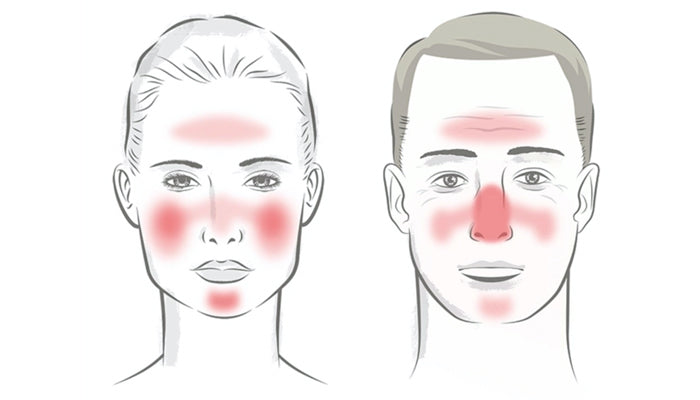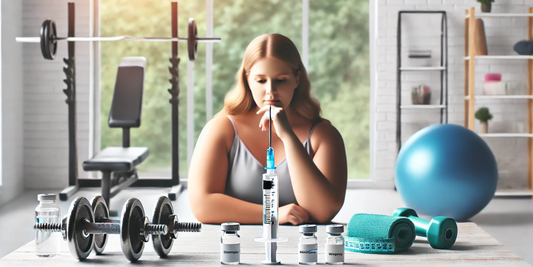What is Rosacea?
Rosacea is seen as a chronic inflammatory skin disease which affects the face. It can cause redness, itching, stinging or burning sensations, which affect the forehead, nose, cheeks and chin. There are three main types of rosacea, characterised by signs and symptoms.- Erythematotelangiectatic rosacea causes skin redness and warmth and visible clusters of blood vessels.
- Papulopustular rosacea causes skin redness, swelling, and pus-filled bumps called pustules.
- Phymatous rosacea is characterized by thickened skin on the face and a bulbous nose.
How can I improve my Rosacea?
1. Protect:
a. Make sure you are using a gentle cleanser. Anything that makes your skin feel tight after using is too harsh. Cleansers are alkaline and can strip away the protective acid barrier on the skin and the protective sebum. If your skin is already irritated you don't want to make this worse. Milky lotion cleansers like Epionce are good but simple ones like Cetaphil can be bought from most chemists. b. If you are in the sun your skin barrier is a bit more sensitive. Make sure to double down on your sunscreen. During the Winter use a moisturiser that has SPF 15. It will also keep you skin soft by stopping thickening of the outer layer (corneum stratum).2. Reduce inflammation
By protecting your skin you can reduce inflammation from the outside but there is also lots you can do to protect from the inside. a. Reduce your trigger foods. Most people already know which foods will trigger their rosacea most. Spicy foods, coffee or some alcoholic drinks. Biodynamic wines tend to have lower levels of sulphites that are one of the triggers so look out for these. Sulphites tend to be higher in white wines as they are added for clarity. b. Increase your natural anti-inflammatory foods. Omega 3 works at the same point as anti-inflammatory medications like ibuprofen by reducing inflammatory mediators and cytokines. Vitamin D will also help. You can check omega 3 and vitamin D levels with our home blood test.3. Support the gut.
Rosacea can be caused by gut problems and when these are fixed the rosacea can disappear. See below for more information on SIBO and how to do this.4. Medical treatments.
Topical antibiotic creams like Soolantra/ ivermectin will calm the skin down during a flare up. At specialist skin clinics like medicetics laser skin treatments are used to reduce redness. Excel V is a special skin laser for redness.What does the HLA gene do?
Among the genes thought to play a role in rosacea, several genes are in a family called the human leukocyte antigen (HLA) complex. This complex helps the immune system determine the difference between a foreign or invader cell, and its own protein. Certain variants in HLA genes likely contribute to the abnormal inflammation synonymous with rosacea, some of which are also linked to other inflammatory conditions like Crohn’s disease. The HLA gene associated with rosacea is intergenic, meaning that it spans two regions, between HLA-DRA and BTNL2. If there is a single T allele in this gene variant there is a 1.2 times increased risk for rosacea. The homozygous TT allele, increases the risk for rosacea by 1.4 times. Another group of genes associated with rosacea are the GST family. Variants in several GST genes have been linked to increased risk of developing rosacea.Gut health and rosacea
A study done on 113 patients investigated the link between SIBO (small intestinal bacterial overgrowth when bacteria grows in the normally sterile small intestine) and rosacea suggested that there are probably more subtypes of disease than we currently understand. Of the 113 patients with rosacea 52 were diagnosed with SIBO. Although this is higher than the normal population it is clearly not the cause in all patients. 32 patients were treated with antibiotics to treat the SIBO and this was successful in 28 patients. In 20 of the 28 the rosacea completely cleared up; in 6 it was markedly improved; 2 patients did not improve. Another group of patients with a stomach bacteria called H. pylori also showed a link to some types of rosacea.Small Intestinal Bacterial Overgrowth in Rosacea: Clinical Effectiveness of Its Eradication
Diet and rosacea: the role of dietary change in the management of rosacea






